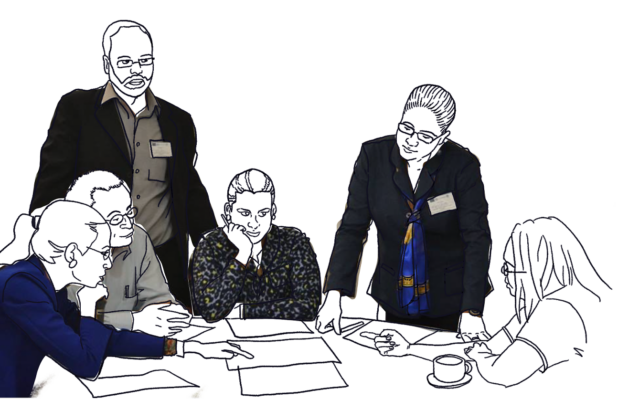Influencing the WHO negotiations of a new pandemic instrument

Hub research on fair and equitable benefit-sharing, One Health and fair research partnerships is contributing to the negotiations of a new international instrument on pandemic prevention, preparedness, response and recovery under the aegis of the World Health Organisation (WHO). On 26 April 2022, Hub Director Elisa Morgera was invited to speak at a hybrid event titled “Averting a collision course? Beyond the pandemic instrument and the International Health Regulations” (Geneva, Switzerland), with the participation of international negotiators and WHO experts. The new draft text of the pandemic instrument (May 2022) has taken on board some of Morgera’s suggestions.
Key recommendations from Hub research
At the event, Morgera delivered a presentation on “critical considerations vis-à-vis the possible outcomes for fair and equitable sharing of pathogens, genetic sequences and benefits under a pandemic instrument”, with some considerations also on the parallel ongoing negotiations on revisions of the International Health Regulations under WHO. Drawing on experiences on fair and equitable benefit-sharing under international biodiversity law and the new Agreement on marine biodiversity of areas beyond national jurisdiction (BBNJ Agreement, see also here) and the need for transformative governance, she underscored the need to:
- enhance international scientific collaboration through fair research partnerships, as this is ultimately essential for the realisation of the treaty objectives in different sectors in which benefit-sharing is applied;
- support synergies across different areas of biodiversity-related research and governance, and to reflect on possible impacts of the WHO Pandemic instrument on biodiversity research and governance;
- ensure effectiveness and good faith, by characterising fair and equitable benefit-sharing as iterative and dialogic partnership-building in the context of power asymmetries. Accordingly, rather than one-way, one-off flow of benefits to passive recipients, benefit-sharing is about the agency of beneficiaries in the co-identification of benefits & sharing modalities;
- embed in new international institutions public participation guarantees, and participatory governance approaches to shed light on different dimensions of fairness and equity as experienced by different human rights holders, taking into account the range of needs of relevant actors (independent experts, stakeholders & users from different communities of practices in Global North & South (natural & social scientists) across the biodiversity-health research, innovation and governance spectrum, database managers, and representatives of other international benefit-sharing regimes;
- clarify State obligations to create necessary preconditions for fair and equitable benefit-sharing, such as obligations to regulate publicly funded research so as to include equity conditions (requiring project co-development with partners in the Global South, prioritising mutual capacity building, technology co-development and joint ventures; and integrating Monitoring, Evaluation and Learning in scientific collaborations); and
- specify that benefit-sharing contractual obligations for companies/private actors should include a mix of benefits to be shared, that can be adapted to the particular needs prioritised at a particular point in time (and in light of lessons learnt in the implementation of the instrument), with explicit benefits that contribute to fair scientific collaborations, mutual capacity building and technology co-development in pandemic prevention, preparedness, response and recovery.
Influence on the next stage of the negotiations
Morgera’s presentation had provided specific textual suggestions, based on an analysis of the February 2023 zero draft of the pandemic instrument. Following her presentation, the revised negotiating text released in May 2023 includes new text that appears to take into account her proposals, notably:
- references to “technology co-development” (Article 11);
- clearer obligations on States to regulate publicly-funded research to support joint ventures and technology co-creation (Art. 9(2));
- obligations for private companies to share benefits also by collaboration with manufacturers from developing countries and WHO initiatives to transfer technology and know-how and strengthen capacities for the timely scale-up of production of pandemic-related products (Option 6(c).X under Article 12, Option 12.B);
- references to “country-driven, transparent, effective and iterative process” for capacity-building and technology collaboration (Option 11.B), which reiterates language as also included in the BBNJ Agreement Articles 44(3-4)), which had been recommended by the Hub also during the BBNJ negotiations.
Existing and future resources
The event was organised by the Geneva Graduate Institute and was attended by 216 participants: 80 in person and 136 online from 53 different countries (24 from Europe, 11 from the Americas, 8 from Asia and 8 from Africa). Participants included WHO staff members and international negotiators of the international pandemic instrument.
The recording of the event, a short video and a written paper by each speaker are available here. An article on the event was published on Health Policy Watch here.
Meanwhile Hub researchers are preparing new research papers on:
- embedding an iterative, participatory governance approach in the WHO pandemic instrument institutional structure;
- innovations in fair and equitable benefit-sharing under the BBNJ Agreement, that could also be relevant for the WHO negotiations;
- the implications of a holistic approach to One Health for the WHO pandemic instrument, and other international negotiations on biodiversity-health nexus.
Related SDGs: